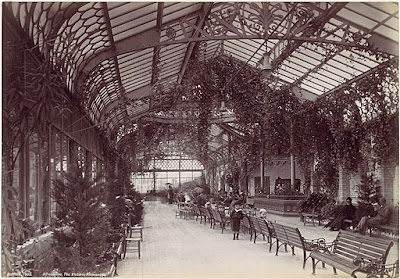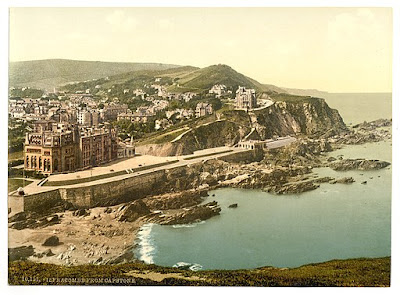When my new novel was published
this year, I became everything I had once disdained.
As an avid amateur historian, I had always shied away from the field of
Alternative History, or Counterfactual History as it’s sometimes called. The genre
tends to leave a bad taste in the mouths of those who try to represent history
as it was. Those novelists who slave away over every detail no matter how
minute – from what shade of blue was possible in the early eighteenth century
before the German pathologist Max Perls invented Prussian Blue, to how long
would it take to travel by train from London to Berlin in 1933? Or how much would
a cup of coffee cost in the Café Kranzler?
I know, because I am one of them.
Alternative History seems to laugh in the face
of all of us who toil in archives and the obscure sections of long remaindered
biographies, who comb through the ex-library-copy memoirs, letters and unpublished
diaries, attempting to resurrect a detailed picture of the past.
The idea of Alternative History especially disturbed me as a former
newspaper journalist. Sceptics might question journalists’ passionate fidelity
to the truth, but the whole aim of our training centres on finding out facts
and standing them up.
And now I was proposing to abandon my fidelity to historical fact, my
caution with chronology, my rigour over real people, in favour of what . . . just
making it up?
Widowland is an Alternative History set in 1953, premised on the
idea that Britain and Germany did not go to war but formed an Alliance in 1940
under the rule of Edward VIII and Queen Wallis. Britain has become a
Protectorate of Germany and the Protector, Alfred Rosenberg, has instituted an
oppressive caste system for women based on the classification of women by
raclal and hereditary status, as instituted in Nazi Germany.
Yet even as I wrote it, I realised that all my deep-rooted objections
were wrong.
Of all the sectors of the Alternative History genre, the Nazi era is one
that keeps on giving. Stand out contributions to Nazi Alternative History include
Robert Harris’s Fatherland, C.J.Sansom’s Dominion, Philip Roth’s The
Plot Against America, and Philip K Dick’s The Man in the High Castle.
This is undoubtedly because the Nazi era spawns so many questions and its
legacy in post war consciousness is immense. The period offers numerous ‘what
ifs’ to tempt us, starting with What If Adolf Hitler had been accepted into the
Vienna Academy of Fine Arts and went on to become a moderately successful
watercolour painter? Later, What If Germany had succeeded in conquering Russia?
And What If D Day had failed?
But does it disrespect the lives of those who lived or died in the war,
to imagine what might have been had none of it happened?
I hope
not. Indeed, I think speculating on the great ‘What Ifs’ of history are part of
being a historian. The posing of counterfactual questions has always been a
legitimate factor in historical thought – Livy, for example, wondered how the
Roman empires would have fared against Alexander the Great. Blaise Pascal
famously mused how if Cleopatra’s nose had been shorter ‘the whole face of the
world would have been changed’.

The ‘What if’ that has always tantalised me, and which I attempted to
tackle in Widowland, is the possibility that Edward VIII might have
remained on the throne, rather than abdicating in 1936. This was highly likely,
and the consequences for the future of Britain would have been momentous.
Edward was friendly with senior Nazis – especially Goering – and had held discussions
with Hitler at the Berghof in 1937. Documents recovered only recently show the
former king urging the Nazis to bomb England more heavily in the cause of
peace. For Edward to remain on the throne, it may be that Wallis Simpson would
have had to refuse him, or it might be, with the support of the press and an
adoring public, he might could have tried to ride out the scandal of marriage
to a divorcée. But certainly, he would have needed to come to an accommodation
with Germany that would drastically alter the British way of life

Asking ‘What If’ encourages us to
examine our belief in the contingency of events and the agency of individuals. Exploring
what didn’t happen is a way of asking about what did, and how closely that path
was avoided. Generally, history is not simplistic, and we don’t live in a
Sliding Doors world where everything hinges on a single action or plan. Historical
events are made up of numerous variables. Archduke Ferdinand’s assassination
might have been the spark that set Europe aflame and combusted the First World
War, but it was not the only precondition; larger historical forces, both
economic and cultural were also in train in 1914.
We are all lucky to be writing at a time of mounting popular enthusiasm
for both history and Historical Fiction. That in itself encourages people to
think about the way we remember history, and how history is rewritten to suit
contemporary narratives.
Although I’m a convert to Alternative History, I do have a couple of
caveats. I won’t feature people who are still living, and I tend only to
fictionalise those people whose lives were fairly public and much observed.
Meanwhile, I face the same quandary as most novelists - not so much What
If as What Next?









